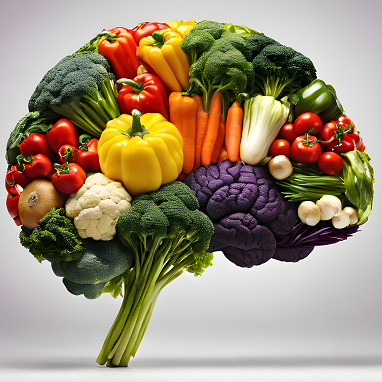Nutrition is often thought of in terms of our physical health. But the impact of food on our bodies is so much more than physical. Did you know some foods actually help us regenerate brain cells, whilst others can destroy them?
If thinking about what you eat feels overwhelming, you are not alone. We will learn here about the evidence linking food and mood and see how understanding the gut-brain connection can help us eat well. But the most important place to start? Be kind to yourself. This is not about judgement or labelling certain foods or eating behaviours as good or bad. You might like to download and print this handout to help you think about different aspects of eating well now.
The exciting new field of nutritional psychiatry is taking our understanding of food and its impact on our body to a whole other level. Our mood is inextricably linked to our food – which means there is lots we can do to take care of body and mind by understanding this a little more.
Our guts (enteric nervous system) and our brains (central nervous system) communicate via the “gut-brain axis”. These messages are influenced by body processes like inflammation, oxidative stress and our gut-microbiota (the millions of bugs in our guts). Which means what we eat impacts our mental health.
Professor Felice Jacka talks to Rangan Chatterjee about her groundbreaking research, the SMILES trial. The study showed – for the first time – the effect of diet on depression.
You can find out more about the SMILES trial from the Food and Mood Centre here.
What do we mean by the gut microbiome? This video gives you a quick introduction.
This TED-Ed talk introduces why fibre and fermented foods are important for our microbiome.
Ongoing research (eg this 2021 paper) is teaching us how fibre and fermented foods increase microbiome diversity and decrease markers of inflammation – all of which benefits our mental health.
You can download and print a handout of links to these proof videos here.
Sometimes it can feel daunting to think about making changes relating to eating well – but see if these ideas help!
You might like to download and print this handout of these suggestions.




Understanding the relationships between the different pillars of Lifestyle Medicine can allow us to use our strengths to support the areas we are trying to change.
Click on the icons below to find out more about the other pillars.
You can also download and print a handout of these relationships here.

Eating well, particularly trying not to eat a large amount later in the day, can improve the quality of our sleep

Eating well can allow us to enjoy movement activities more

Eating well, especially eating less ultra-processed food, can reduce the levels of stress in your body

Eating well can be an experience to share with others

Eating well can make unhelpful coping strategies less appealing

You may find you feel more motivated to eat well if you are well rested – it can take energy to make good choices so a good night’s sleep is key

Moving more may motivate you to fuel well with nutritious food

Stress responses in our body and brain can make us crave unhealthy food choices – reducing stress can make it easier to eat well

You might enjoy sharing a meal with others and find their support encourages you to prepare healthy food

Minimising unhelpful coping strategies can allow you to find pleasure in eating well
Here are some more insights you might find helpful to explore:
What do you notice when you eat well? What helps you eat well?
You might find it helps to keep a note of the things that particularly support you with eating well, so you can refer back any time you need. You can download and print this handout if you find it helpful.